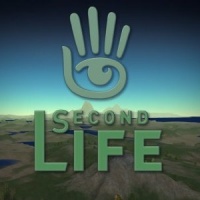Difference between revisions of "Second Life"
| Line 31: | Line 31: | ||
== Avatars/Residents == | == Avatars/Residents == | ||
| − | [[File:Newbie-avatar-survey1.jpg|200px|thumb|right|Second Life Avatars] | + | [[File:Newbie-avatar-survey1.jpg|200px|thumb|right|Second Life Avatars]] |
Users create [[Avatars]] through the Second Life software. Avatars can be humans, animals, vegetation, minerals or a combination. Some users create avatars to resemble themselves, while others choose to create "alter egos." There are some ethical concerns with creating alter ego avatars, concerning race and gender. | Users create [[Avatars]] through the Second Life software. Avatars can be humans, animals, vegetation, minerals or a combination. Some users create avatars to resemble themselves, while others choose to create "alter egos." There are some ethical concerns with creating alter ego avatars, concerning race and gender. | ||
Latest revision as of 18:50, 10 December 2012
Second Life is an online role-playing game launched by Linden Labs in June 2003. Players (called residents in-game) use client programs (called viewers) to enter a virtual world and perform real-life and fictional actions. These actions may include interacting with other users to play activities and exchange items. Residents create an alternative life using the program. Residents socialize, create friend groups, participate in group activities, and can even trade property and services. As of 2011, there are approximately one million active users on Second Life.
Contents
History
| Year | Important Historical Event in Second Life. |
| 1999 | Philip Rosedale formed Linden Lab. |
| 2008 | Residents spent a total of 28,274,505 hours "inworld". |
| 2008 | Second life honored at 59th Annual Technology and Engineering Emmy Awards. |
| 2009 | Residents total spent hours drops to 62,000. |
| 2010 | Residents total spent hours drops again to 54,000. This is due to new rules
implemented by Linden Labs, decreasing the numbers of campers and bots. |
| 2010 | Linden Labs laid off 30% of its workforce. |
Avatars/Residents
Users create Avatars through the Second Life software. Avatars can be humans, animals, vegetation, minerals or a combination. Some users create avatars to resemble themselves, while others choose to create "alter egos." There are some ethical concerns with creating alter ego avatars, concerning race and gender.
Ethical Issues
Crime
There are many ethical issues present in Second Life. One major ethical concern on Second Life is crime. Larry Dignan at the Tera Nova State of Play conference said, "virtual worlds are virgin territory for law." Although the crimes are committed in the virtual world, accountability for these crimes is imperative for the world to exist. Crimes such as Virtual Rape not only affect the avatar, but also the controller. Lawmakers, Linden Labs and the residents of Second Life need to agree on a feasible system to deal with the crimes committed on the site.
Rights of the Avatar
Linden Labs controls the Second Life site, thus owning the property and avatars. Linden Labs have their own terms of service among other policies. Currently, if a avatar is not happy with the way Second Life is run, there is not way to change policies, or even leave the system, because Linden Labs owns their property. According to Edward H. Spence, avatars have rights to freedom and well-being. [1]
Regulations
Through changes to the terms of service and by imposing technological limitations, Linden Labs has tried to take control over in-game crime and other unethical actions by implementing regulations on the site based on international laws, even though users may be in compliance with laws within their own country. Although regulations have been made in terms of business regulation, no compensation has been offered to the residents the new policies hurt, which leads to even more ethical issues.
CopyBot
Lawmakers and Linden Labs themselves are currently attempting to settle on a deal with the CopyBot, a program used to copy objects that other people have made. The issue is, no one really knows how to deal with the ample amounts of copying that go on in Second Life or at what point the government should get involved with Second Life affairs.
Effects on the Controller
Another ethical issue present in Second Life affects the controller in their life outside of Second Life. Users can become so ingrained in their avatars life, that they begin to lose their sense of reality. The boundaries between the real and virtual world merge. This can affect their day-to-day activities, relationships, school and work. Other multiplayer online roleplaying games that are analogous to Second Life are some of the most addictive features of the Internet, due to the system of goals that are found in the game. If Internet addiction happens to a student, it could lead to poor academic achievement in school, lack of socializing with others, and ignoring many other real world responsibilities.
See Also
- Information Ethics
- Online Cheating
- Virtual Reality and Computer Simulations
- Virtual Rape
- Virtual Community
References
- ↑ Spence, E., “Meta Ethics for the Metaverse: The Ethics of Virtual Worlds,” in Current Issues in Computing and Philosophy, edited by A. Briggle, K. Waelbers and P.A.E. Brey. Amsterdam: IOS (2008).
